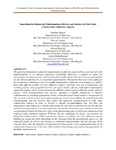| dc.description.abstract | The universal demand for industrial transformation in effective project delivery process led to the
implementation of an advance innovative technology. However, a number of issues are
increasingly becoming relevant with the industrial transformation. The most vigorous among them
are the drivers and barriers to industrial transformation. The barrier that need to be addressed
for an advance technology to be successfully implemented within the work domain are culture;
given that different parties will have different cultures with their own sets of behaviours and
working practice. Such pragmatic barriers are said to hinder effective industrial transformation
among the parties, which in turn prevents the efficiency improvement within the project delivery
process. Such interdependency for success, demands a suitable framework to improve
collaboration, by attaining appropriate culture within the project-based industry. The purpose of
this research work is to have deep understanding of drivers that facilitate the smooth industrial
transformation and the barriers that hinder the industrial transformation in Yobe State
construction industry in order to develop a suitable recommendation that will allow the
management and employees to deeply understand the vital drivers and barriers for an effective
industrial transformation. A set of solutions for managerial, integration and cultural orientations
was developed. Empirical data were collected by questionnaire survey which was summarised and
analysed using statistical analysis SPSS,and the key challenges of drivers and barriers on
industrial transformation in Yobe construction industry were figure out. The empirical research
findings are group into three depending on the responses from the questionnaire survey i.e. the
industrial detail, the drivers and barriers to industrial transformation. And the outcome of the
research shows that the majority of respondent are from private sector organisations that are in
construction business for 5-10 years while Architect from design and engineering department in
building construction an
Keywords – Innovation, Transformation, Project delivery, Culture, Implementation. | en_US |

